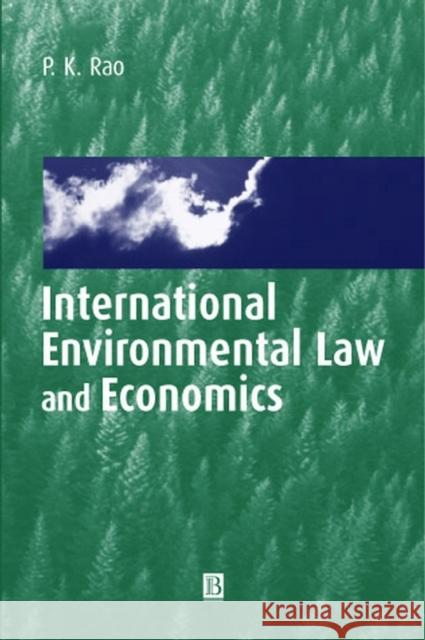International Environmental Law and Economics » książka



International Environmental Law and Economics
ISBN-13: 9780631218920 / Angielski / Twarda / 2001 / 360 str.
International Environmental Law and Economics
ISBN-13: 9780631218920 / Angielski / Twarda / 2001 / 360 str.
(netto: 598,77 VAT: 5%)
Najniższa cena z 30 dni: 621,03
ok. 30 dni roboczych.
Darmowa dostawa!
This book integrates important milestone cases with new analyses to provide comprehensive coverage of environmental law and economics.
List of Boxes.
Preface and Acknowledgments.
Overview of the Book.
Abbreviations.
Part I: Global Environmental Economics:.
1. Sustainability and Sustainable Development:.
Introduction.
International Public Law, Environment, and Economics.
Elements of Ecological and Environmental Economics.
Intergenerational and Intragenerational Welfare.
Environment and Public Health.
Summary.
Appendix: International Environmental Agreements.
Review Exercises.
References.
2. Global Environment and International Cooperation:.
Introduction.
Environmental Externalities.
Property and Liability Rights.
Economic Instruments and Institutions.
Transaction Cost Economics.
Economics of Contracts.
Economics of Cooperation and Coordination.
Summary.
Review Exercises.
References.
3. Economic and Environmental Decision Making:.
Introduction.
Uncertainty and Incomplete Information.
The Precautionary Principle.
Reconciling Economic and Environmental Criteria.
Cost–Benefit Analysis and Incommensurability.
Appraisal and Evaluation Methods.
Review Exercises.
References.
Part II: International Environmental Laws:.
4. Soft Laws, Treaty Provisions and the Law:.
Introduction.
Sources of International Public Law.
Concept and Principles of International Environmental Laws.
Treaty Reservations.
International Relations Theory and IEL.
Voluntary Participation and Sovereignty.
Interface of Regional and International Laws.
Summary.
Review Exercises.
References.
5. Biological Resources and the Environmental Laws:.
Introduction.
Biological Conservation and CITES.
Biological Diversity and CBD.
Fisheries, Marine Life and the Laws of the Sea.
Forest Resources.
Summary.
Review Exercises.
References.
6. Laws Based on Environmental Phenomena:.
Introduction.
Greenhouse Gases and the UNFCCC.
Kyoto Protocol and Later Developments.
Ozone Depletion, Vienna Convention and the Montreal Protocol.
Dsertification and the UN Convention.
Hazardous Materials, the Basel Convention and the Rotterdam Convention.
Transboundary Water and Air Pollution Agreements and Conventions.
Summary.
Review Exercises.
References.
Part III: Integration and Synthesis:.
7. International Economic Laws and the Environmental Laws:.
Introduction.
Global Welfare and Complementarity of Legal Provisions.
International Economic Law.
Multilateral Development Finance and the Environmental Laws.
Environmental Responsibility of International Organizations.
Interface of Economic and Environmental Laws.
Modernizing and Reforming the Laws and their Implementation.
Summary.
Review Exercises.
References.
8. International Trade and the Environmental Laws:.
Introduction.
Environmental Trade Measures and Experience with CITES.
Trade Liberalization and Environmental Costs.
Regional Trade and Environmental Arguments.
Internatioanl Trade Laws and the Environmental Laws.
Summary.
Review Exercises.
References.
9. Compliance, Dispute Resolution and Governance.
Introduction.
Compliance, Monitoring, and Effectiveness.
Environmental Information.
Dispute Settlement Mechanisms.
Economic Incentives and Disincentives.
Toward Effective IEL.
Concluding Observations.
Review Exercises.
References.
Web Site Addresses.
Index.
P. K. Rao is Director of the Centre for Development Research, Princeton, New Jersey. He has taught at the Administrative Staff College of India, Harvard University (Senior Fulbright Scholar), and Rutgers University. Among his recent books are Sustainable Development (Blackwell, 2000), The Economics of Global Climatic Change and The World Trade Organization and the Environment.
International Environmental Law and Economics combines new analysis and milestone cases to create a comprehensive guide to environmental law and economics. Its analyses are intended to lead to operationally meaningful environmental policies and international laws governing the global environment. The fundamentals of ecological and environmental economics, the concept of sustainable development, and the economics of environmental sustainability are then explained. The book draws on several analytical techniques, including game theory, optimization, and decision–making under uncertainty, to examine key issues: how are international environmental laws implemented in the absence of apex law–enforcement mechanisms? has a mechanism of law enforcement emerged? is there a concern for compliance and non–compliance at the state and international levels? what improvements are desirable and feasible in global environmental governance?
1997-2026 DolnySlask.com Agencja Internetowa
KrainaKsiazek.PL - Księgarnia Internetowa









